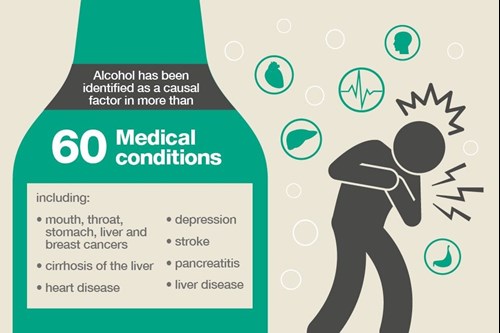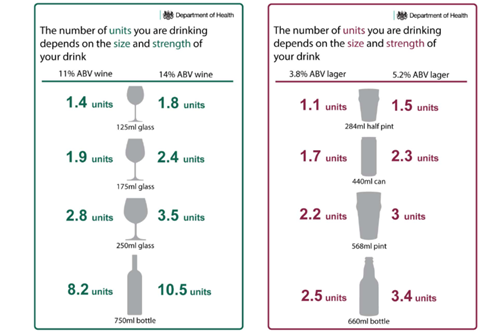Help and support for alcohol use
If you're worried about your drinking please see the helpful information below. If you need any further help and advice, please contact Shropshire Recovery Partnership (part of the We Are With You organisation) on 01743 294700 or the free confidential online chat service, available:
- Weekdays between 10:00 - 16:00 and 18:00 - 21:00
- Weekends from 11:00 - 16:00
Help and advice regarding alcohol use
Alcohol is the third biggest health risk factor after obesity and smoking. It is now acknowledged that there is no safe limit of alcohol consumption. How much and how often you drink can seriously affect your health and long-term quality of life. Latest guidance from the Chief Medical Officer explains:
- To keep health risks from alcohol to a low level it is safest not to drink more than 14 units a week on a regular basis
- If you regularly drink as much as 14 units per week, it's best to spread your drinking evenly over three or more days. You increase your risk of long-term illness and injury if you have one or two heavy drinking episodes a week
- The more you drink on a regular basis, the more your risk increases of developing a range of health problems (including cancers of the mouth, throat and breast)
One unit is 10ml or 8g of pure alcohol. Because drinks come in different strengths and sizes, units are a way to tell how strong your drink is.
It takes an average adult around an hour to process one unit of alcohol so that there's none left in their bloodstream, although this varies from person to person. Weight, size and gender can all impact on the way alcohol is processed through the body.
Alcohol and dependency
If after several hours without a drink you start to experience withdrawal symptoms such as shaking, sweating, nausea or headache, this might mean you have become physically dependent on alcohol and will go into a withdrawal. Alcohol withdrawal can be fatal and has serious complications if undertaken without medication, you may experience symptoms like seizures and confusion with hallucinations. Please seek help from your GP or Shropshire Recovery Partnership.
If you experience a seizure, become confused, start to see or hear things which others cannot hear, develop double vision or become unsteady on your feet, you should call an ambulance on 999 or ask someone you live with to call an ambulance.
Advice and help to manage your drinking
A number of apps and online tools are available to help you manage and monitor drink free days, record your units and help you assess your drinking habits.
There are many steps that you can take to help you, or someone else, to reduce the amount of alcohol that they drink. The NHS Drink Free Days app can be a useful tool to start reducing alcohol intake, and there are a range of mutual aid support and provision available across Shropshire.
Links to apps to support with reducing or controlling your drinking:
Alcohol related support
Alcoholics Anonymous (AA) operate a helpline 24/7 on 0800 9177 650, email: help@aamail.org or live chat via their website. Find out where you can access a local AA meeting.
Drinkline, a free, confidential helpline for people who are concerned about their drinking, or someone else's. Call 0300 123 1110 (weekdays from 09:00 - 20:00 and weekends from 11:00 - 16:00).
You can also join a SMART Recovery meeting online.
Support for families and those affected by someone else’s alcohol use.
Alcohol use affects the people around the drinker too. The Office for Health Improvement and Disparities (OHID) explains that children of parents who misuse alcohol are more likely to have behavioural, physical or physiological problems, and alcohol plays a part in 25% to 33% of known cases of child abuse.
Alcohol affects both carers and adult family members. With this in mind, the Care Act 2014 recommends that carers have an assessment of their needs. In Shropshire, this can be requested by contacting our first point of contact team on 0345 678 9044.
Shropshire Recovery Partnership support family members and others affected by someone’s drug and alcohol use. There is also help and support available through the With You website.
Nationally, Alcohol Change UK and Al-Anon Family Groups offer help, advice and signposting for family members who need support.
Alcohol and pregnancy
There is no safe level of alcohol to drink in pregnancy. The Chief Medical Officers for the UK recommend that if you're pregnant or planning to become pregnant, it is safest simply not to drink alcohol at all, as this will keep risks to your baby to a minimum.
Drinking in pregnancy can lead to long-term harm to the baby and the more you drink, the higher the risk. You can visit the NHS website for more information.
Further information
- Easy read information
- First point of contact
- We are with you
- NHS alcohol support
- NHS drink less advice
- NHS information about drinking while pregnant
- Al-Anon: Providing support to anyone affected by someone else’s drinking
- Drugs and alcohol: Young Minds Guide for Parents
- Help with drinking as you age from DrinkWise
- Tools to reduce your drinking
- Drinkaware: independent alcohol advice
- Alcohol change: For information, help and support

